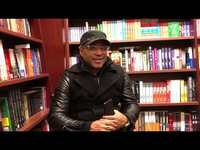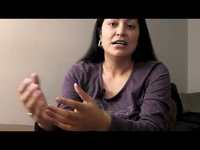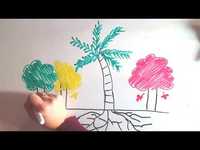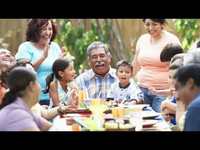Items
Tag
Bilingual [English-Spanish]
-
 Creating Identity through Music This portrait demonstrates through various music clips, the integration of music and the importance in my partners life. Through being from a family of doctor’s in Havana, being the only musician enabled him to attend school for “free” in Cuba after being 1 of 6 chosen. Through participating in a program that enables him to arrive in Canada, and for a fee that is to be paid back to the government, is able to play concerts in Canada. He speaks about how the connection of music amongst different composers, no matter the sound or instrument, is a family and a connected language. He represents his identity through the constant listening and incorporating of music into his saxophone, drums, and piano gigs, alongside dj’ing at various clubs within London. Through tailoring his music towards the cultural crowd, and being able to adapt and fit in with the crowd with unique and current songs, brings forward the ability for various cultural groups to feel connected through the language of music. A universal language.
Creating Identity through Music This portrait demonstrates through various music clips, the integration of music and the importance in my partners life. Through being from a family of doctor’s in Havana, being the only musician enabled him to attend school for “free” in Cuba after being 1 of 6 chosen. Through participating in a program that enables him to arrive in Canada, and for a fee that is to be paid back to the government, is able to play concerts in Canada. He speaks about how the connection of music amongst different composers, no matter the sound or instrument, is a family and a connected language. He represents his identity through the constant listening and incorporating of music into his saxophone, drums, and piano gigs, alongside dj’ing at various clubs within London. Through tailoring his music towards the cultural crowd, and being able to adapt and fit in with the crowd with unique and current songs, brings forward the ability for various cultural groups to feel connected through the language of music. A universal language. -
 Memories in The Present Katherine Tibasosa, originally from Bogota, Colombia, moved to London, Ontario about a year ago with her husband and children. Katherine discusses the significance of weather, different regions in her country, and traditional foods. Moreover, since coffee is a very significant part of Colombian culture and Katherine's life, she opens up about how she keeps that aspect of her culture alive here in London. This video focuses on how she keeps the various aspects of her culture alive since moving from Colombia.
Memories in The Present Katherine Tibasosa, originally from Bogota, Colombia, moved to London, Ontario about a year ago with her husband and children. Katherine discusses the significance of weather, different regions in her country, and traditional foods. Moreover, since coffee is a very significant part of Colombian culture and Katherine's life, she opens up about how she keeps that aspect of her culture alive here in London. This video focuses on how she keeps the various aspects of her culture alive since moving from Colombia. -
 Small Country, Big Celebrations: The Role of Salvadoran Celebrations in Cultivating Identity and Belonging In this video, Claudia calls attention to a part of her culture that is often overlooked. In contrast to holidays celebrated in Canada, national celebrations in El Salvador take place out on the streets and bring together an entire community. She considers the major role that climate and religion play in building a sense of community in El Salvador. Drawing on childhood memories, she describes celebrations such as Virgen de Guadalupe, Día de la Cruz, and Semana Santa, which are all rooted in a shared religion. In addition, she reflects on the unifying power of street celebrations, and how they function to gather people of different backgrounds in a common place. In the conclusion, Claudia provides her definition of community which is influenced by her experiences with celebrations and traditions. Her definition further encompasses what it means to be a part of a community in a new country.
Small Country, Big Celebrations: The Role of Salvadoran Celebrations in Cultivating Identity and Belonging In this video, Claudia calls attention to a part of her culture that is often overlooked. In contrast to holidays celebrated in Canada, national celebrations in El Salvador take place out on the streets and bring together an entire community. She considers the major role that climate and religion play in building a sense of community in El Salvador. Drawing on childhood memories, she describes celebrations such as Virgen de Guadalupe, Día de la Cruz, and Semana Santa, which are all rooted in a shared religion. In addition, she reflects on the unifying power of street celebrations, and how they function to gather people of different backgrounds in a common place. In the conclusion, Claudia provides her definition of community which is influenced by her experiences with celebrations and traditions. Her definition further encompasses what it means to be a part of a community in a new country. -
 Cultural Connections: A Colombian's Journey to London In this video, we follow Alberto Alvarez as he journeys from Colombia to London. We will delve into his experience with being a new immigrant in Canada while also trying to understand what it is like to become part of a new culture/new community. Alberto then explains the process of reconnecting with his Colombian roots through the London community. Further, this project will seek to understand how culture and identity intertwine to create a distinct cultural identity that differs depending on who you are around at a specific point. Community Connections brings together music, image, and video to tell the story of a determined young man who grapples with his identity to become the bicultural community member he is today.
Cultural Connections: A Colombian's Journey to London In this video, we follow Alberto Alvarez as he journeys from Colombia to London. We will delve into his experience with being a new immigrant in Canada while also trying to understand what it is like to become part of a new culture/new community. Alberto then explains the process of reconnecting with his Colombian roots through the London community. Further, this project will seek to understand how culture and identity intertwine to create a distinct cultural identity that differs depending on who you are around at a specific point. Community Connections brings together music, image, and video to tell the story of a determined young man who grapples with his identity to become the bicultural community member he is today. -
 Maintaining & Sharing your Cultural Identity: Through Education, Exposure, & Experience The video explores the cultural identity of Jose. A. Casanova, with a particular focus on how food serves as reminder of where he has come from. We not only talk about how food has shaped who he is today, but also the people who have influenced him significantly, including his mother. Over time, his core values have not diminished despite a change in location. Through passing on values from his Venezuelan culture and his wife’s Colombian culture to his children, he actively encourages them to be culturally humble and to embrace their diverse cultural identity. He does this by emphasizing that they are not just from one community, but they are from three: Canadian, Venezuelan and Colombian. He provides advice on the best way to preserve one’s cultural identity, so that one can maintain one’s roots and not forget where one has come from. He also stresses on the importance of helping others because having gone through the challenges that come with being a new immigrant in Canada himself, he realizes a little help can go a long way.
Maintaining & Sharing your Cultural Identity: Through Education, Exposure, & Experience The video explores the cultural identity of Jose. A. Casanova, with a particular focus on how food serves as reminder of where he has come from. We not only talk about how food has shaped who he is today, but also the people who have influenced him significantly, including his mother. Over time, his core values have not diminished despite a change in location. Through passing on values from his Venezuelan culture and his wife’s Colombian culture to his children, he actively encourages them to be culturally humble and to embrace their diverse cultural identity. He does this by emphasizing that they are not just from one community, but they are from three: Canadian, Venezuelan and Colombian. He provides advice on the best way to preserve one’s cultural identity, so that one can maintain one’s roots and not forget where one has come from. He also stresses on the importance of helping others because having gone through the challenges that come with being a new immigrant in Canada himself, he realizes a little help can go a long way.